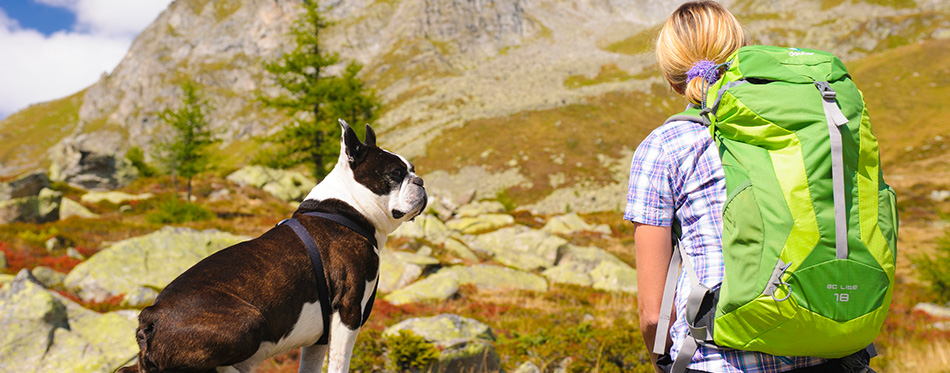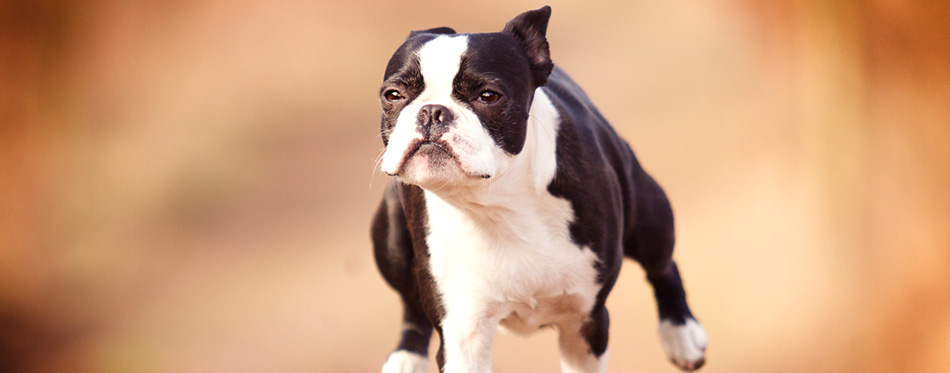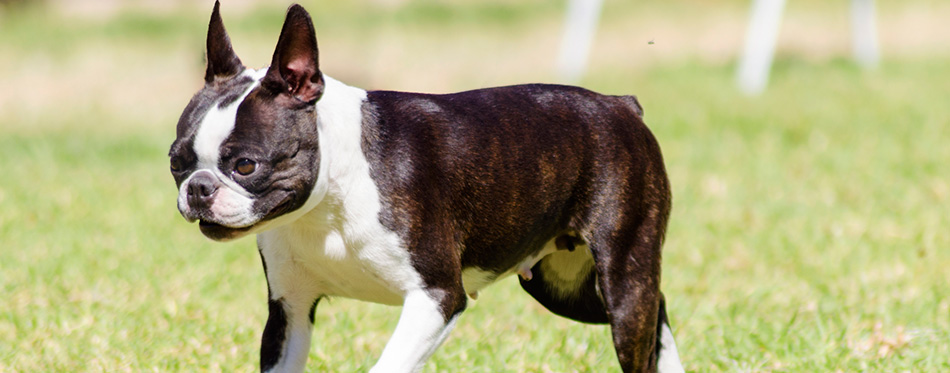Affectionately known as the ‘American Gentleman’ due to the tuxedo-like white pattern on their short coat, the Boston Terrier is a small dog with a big heart and can make a wonderful family pet. One of the US’s few home-bred breeds, the Boston Terrier has an energy and intelligence that makes him a joy to be around. Yet for all that liveliness he doesn’t need excessive amounts of exercise, making him a fantastic companion for busy families or older people as well as being a well-suited urban-dwelling dog.
We take an in-depth look at the Boston Terrier to discover exactly why this flat-nosed, energetic and loyal breed can make a really special addition to your family.

History of the Boston Terrier
One of the few breeds to have been exclusively bred in the US, the Boston Terrier has a heritage that dates back to the late 1800s. And while it’s no surprise that the first pup arrived in Boston Massachusetts, there are some contradictions about how this gorgeous breed came to be. There are two accounts as to the origin of the Boston Terrier, the first that it was originally bred by coachmen of wealthy Boston families to be a pit fighter. A conflicting account has it that today’s Boston Terrier came from one dog called Judge, who was a bulldog/English terrier cross imported by a Bostonian called Robert C Hooper after the dog reminded him of a pet he had in childhood. Whichever account is true, subsequent breeding resulted in the Boston Terrier, a breed that proved to be less of a fighter and more of the loveable pet we know today.
In the early breeding days, they weren’t actually known as Boston Terriers, but more commonly called American terriers, Round Heads, Bullet Heads or Boston bulldogs. Eventually renamed the Boston Terrier, the breed was finally recognized by the American Kennel Club in 1893 and is one of the first non-sporting dogs to be bred in the USA. In 1979 the Boston Terrier was named the official state dog of Massachusetts.
Quick Facts About the Boston Terrier
One of the happiest breeds of dog you can find, the cheerful little Boston Terrier makes a wonderfully affectionate family pet. Here are just a few ‘did you know…?’ snippets about the playful and loyal Boston Terrier:
Size and build: The average adult Boston Terrier size is around 16-17 inches to the shoulder and when it comes to a healthy Boston Terrier weight, they should be 10-20 pounds for females and 15-25 pounds for male dogs. Although small, Boston Terriers are certainly no weaklings, with their sturdy and muscular build creating a well-proportioned body. They are handsome looking animals too, with a broad chest and distinct square head, enhanced by their wide and very appealing eyes. Put all together, and a healthy Boston Terrier should look solid and well-built without appearing overweight or spindly.
A distinct face: Thanks to their squashed face and short head, Boston Terriers belong to a class of dogs known as brachycephalic. Brachycephalic dogs have a lower jaw that is actually in proportion with the rest of their body, but the upper jaw is shortened, which gives them the pushed in face look. Their nose and face are wrinkle free, giving them an open and honest look, with big eyes and very distinct, erect pointy ears. Another defining physical feature of the Boston is their tail, which is naturally short and set low on their butt, and often presents in a corkscrew.
Coat and colors: The Boston Terrier is known as the ‘American Gentleman’ for a reason and that is to do with the colors and marking of their short, smooth coat, with the crisp white marking on their front resembling a tuxedo jacket. The traditional Boston Terrier colors are either brindle, black or ‘seal’ (black with a gorgeous red cast), all with white markings.
They are dog sport stars: OK, they may be small, but Boston Terriers are bundles of energy that love to play and, with their intelligent demeanor, can really excel in doggy-related sports, including agility, flyball and obedience. Add in their loving, friendly, confident personality and these gorgeous terriers can also make excellent therapy dogs. You may also like our article on dog agility tunnels.
They can overheat: With their short face and limited snout, Boston Terriers cannot cool down the air going into their lungs as well as longer-nosed dogs and so can be prone to overheating. This puts them at risk of heatstroke so should be kept indoors and cool on hot weather days. And, with their short coat, they are not that good at tolerating extremes of cold either so care should be taken when the temperature drops.
They only have small litters: Female Boston Terriers can find giving birth difficult, due to their small pelvises and Boston Terrier puppies’ typically large heads and so their litters tend to be on the small side, around three to four, with single pup litters not unheard of. Their physical build also makes a cesarean delivery quite common. These small litter sizes mean you will probably have to wait several months to find a puppy, but just ensure you always go to a reputable and recognized breeder.
They make great apartment pets: As with most breeds named after cities, the Boston Terrier is a well-adapted urban dweller and as they are relatively quiet, affectionate and gentle dogs that are portable and not prone to yappiness, they are well suited to apartment living. They also don’t require excessive exercise and can live without a backyard as long as they have companionship and a daily walk to blow off the cobwebs!

Things You Should Know
As a pedigree breed, a Boston Terrier pup is not cheap, and you should expect to pay between $600-$1,200 for one of these cute little ones. And, while they are relatively low maintenance, taking on a Boston Terrier puppy is still a commitment you need to be sure you and your family are ready for. Before you make your final decision on whether this breed is right for you, here are the Boston Terrier facts you need to know.
Health
Generally robust and healthy, the Boston Terrier life span is on average between 10 and 14 years. But during this time, they can be prone to several health issues, some due to the size and shape of their face and nose, not least respiratory issues, snoring and drooling.
Other potential health concerns for Boston Terriers include:
Eye problems – your Boston Terrier can be prone to several eye conditions as well as potential eye injuries due to the prominence of their eyeballs. The main eye conditions to look out for are:
- Cataracts – Boston Terriers are prone to cataracts, both as puppies and as senior dogs. Cataracts can develop between eight weeks and one year so when buying your new pup, ask the breeder if it has been tested for juvenile cataracts.
- Cherry eye – this is where the gland of the third eyelid prolapses and is believed to be a genetic condition. It can happen in young dog, less than a year old and he prolapsed gland can either repositioned surgically or removed altogether by your veterinarian.
- Other eye conditions – Boston Terriers can also be susceptible to other eye conditions, including glaucoma, corneal dystrophy, corneal ulcers and dry eye syndrome.
Patellar Luxation – also known as slipped stifles, this condition can cause lameness or an abnormal gait when the three parts of the patella – or knee bone – are not properly aligned and is common in smaller dogs. This disease can be present at birth, but the symptoms not realized until much later, and can lead to arthritis in the joints.
Heart murmurs – Boston Terriers can also be susceptible to heart murmurs, where a defect in the mitral valve causes a backflowing of blood into the left atrium, meaning the heart is not as efficient as it should be in pumping blood around the body. Heart murmurs are typically treated through a low-sodium diet, diuretics and medication.
Related Post: Low Sodium Dog Food
Deafness – the Boston Terrier breed also has a higher incidence of deafness in one or both ears, with dogs who are white over more than one third of their head or body at a higher risk of producing deaf pups. The breeder should have had their pup litter tested for signs of hearing loss so make sure you ask for evidence before you buy.
Reverse sneezing – with their short snout, Boston Terriers can also have regular bouts of reverse sneezing, especially then they get over-excited or gulp down their food. It happens when nasal secretions drop onto their soft palate, causing it to cover over the windpipe and resulting in your pooch making an alarming wheezing sound. You can help to shorten each episode by keeping your dog calm and stroking their throat until their breathing returns to normal.
Training
Intelligent and quick to pick up new skills, the Boston Terrier can also be a tad stubborn and so a little patience is needed when it comes to their training. But they are eager to please so for effective training, it is a good idea to start early with the playful terrier and be consistent with your commands and requests. The Boston Terrier will also benefit from early socialization so carefully introduce them to a wide range of sounds, scents and experiences to build up their confidence and acceptable behavior. But they are also sensitive and will take confidence from their special human, so be aware of your tone of voice and use positive reinforcement rather than reprimand to get your pup obediently playing ball and motivated to learn.
Exercise
Relatively high energy, but with a liking for the simple pleasure of loafing about on the sofa, the Boston Terrier is a dream to exercise and keep entertained. Although lively, they don’t have a need for excessive exercise and will enjoy a daily walk of around 20-40 minutes a day, whether that is around the block or for a good old run in the park. Short, energetic sessions suit the Boston Terrier’s personality rather than intensive and prolonged exercise. Just be mindful of their issues of regulating their body temperature as well as their short coat and adjust their exercise in hot or cold weather. They also love to play so time playing fetch the ball in the backyard is also a good way to add to their exercise quota.
Nutrition
Boston Terriers have a tendency to be greedy when it comes to their food so the amount they eat needs to be monitored to prevent them becoming overweight. These small dogs are also prone to flatulence and so respond well to a grain-free, nutritionally balanced diet. The amount your pooch is fed does depend on their age, size and activity levels but as a general guide, Boston Terriers are best suited to 0.5 – 1.5 cups of dry food a day, spread over two meals. You may also find your Boston Terrier has a tendency to be a picky eater so work out what dog food suit them and get the best quality you can. Take a look at our review of dry dog food.
Grooming
As a breed, these little dogs are low maintenance when it comes to grooming care, thanks to their short coat and minimal Boston Terrier shedding. To maintain the health and condition of their coat and skin, it is recommended that they are brushed weekly and bathed as needed to keep them fresh. However, it is a good idea to gently wash their face daily, paying attention to their ears and eyes and wiping them clean, while looking out for any signs of redness or irritation. Brushing their teeth 2-3 times a week will keep on top of their dental hygiene and prevent bad breath and gum disease. For a wider selection of choices, check out our dog wipes and dog toothpaste guides.

Temperament
There is so much to love about the Boston Terrier temperament – intelligent, lively, affectionate, playful, and even-tempered, even quiet when they need to be. Add this all up, and this spunky little dog will make an excellent family pet. But there are some traits that may need to be managed to ensure you have a contented dog and a happy pet-owning life.
While they have an overall gentle and amiable personality, the terriers can get a little territorial, especially when they feel other dogs are invading their space. But this can be countered by early socialization. Boston Terriers also make excellent companions for senior citizens as well as willing playmates for older children, but can be a little overwhelmed by smaller, boisterous tots. But they do love to play, with digging, playing fetch and chase games their favorite fun pastimes. Boston Terriers also love company and will be loyal to and protective of their humans, but the downside to this is they are prone to separation anxiety if left on their own for too long. But as a happy, entertaining and loving companion, this small but big-hearted terrier will bring many years of happiness, to both a single and older family household.
Sources:
- Boston Terrier – AKC
- Boston Terrier History – Boston Terrier Club of America

